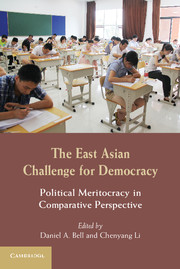Book contents
- Frontmatter
- Dedication
- Contents
- Contributing Authors
- Acknowledgments
- Introduction
- Section I The Theory of Political Meritocracy
- 1 Political Meritocracy and Meritorious Rule
- 2 A Confucian Version of Hybrid Regime
- 3 Confucian Meritocracy for Contemporary China
- 4 The Liberal Critique of Democracy
- 5 Meritocratic Representation
- Section II The History of Political Meritocracy
- Section III Realizing Political Meritocracy Today
- Index
- References
4 - The Liberal Critique of Democracy
Published online by Cambridge University Press: 05 June 2014
- Frontmatter
- Dedication
- Contents
- Contributing Authors
- Acknowledgments
- Introduction
- Section I The Theory of Political Meritocracy
- 1 Political Meritocracy and Meritorious Rule
- 2 A Confucian Version of Hybrid Regime
- 3 Confucian Meritocracy for Contemporary China
- 4 The Liberal Critique of Democracy
- 5 Meritocratic Representation
- Section II The History of Political Meritocracy
- Section III Realizing Political Meritocracy Today
- Index
- References
Summary
DEMOCRACY, MERITOCRACY AND MERITARCHY
It is conventional to talk of the “liberal democracies” of the West. This phrase suggests an assumption – that democracy is one of liberalism's fundamental tenets; the assumption now seems, by and large, to be taken for granted. Historically, however, liberals had grave reservations about democracy. In Europe, these reservations emerged particularly clearly soon after the French Revolution, in the form of a conflict between two ideals of the new order: that of liberals and that of a democratic, radical, or Jacobin opposition; in America, they were raised already in the Federalist papers.
This chapter is about the critical assessment of democracy's virtues and vices that can be made from a liberal point of view. I do not directly discuss criticisms of democracy that come from quarters that are not liberal. Also, my concern here is with liberal critiques of democracy rather than democratic or communitarian critiques of liberalism. I use the term “liberal” in a way that does not assume that democracy is one of the defining tenets of that view.
Insofar as liberals have concluded that their favored political order is threatened under democracy, they have often reached for remedies that limit it. It is useful to distinguish, from the outset, two ways of limiting democracy that differ importantly in principle, although they may well blend in practice. With apologies for introducing new terminology, I call them the meritocratic and the meritarchic.
- Type
- Chapter
- Information
- The East Asian Challenge for DemocracyPolitical Meritocracy in Comparative Perspective, pp. 116 - 137Publisher: Cambridge University PressPrint publication year: 2013
References
- 4
- Cited by



